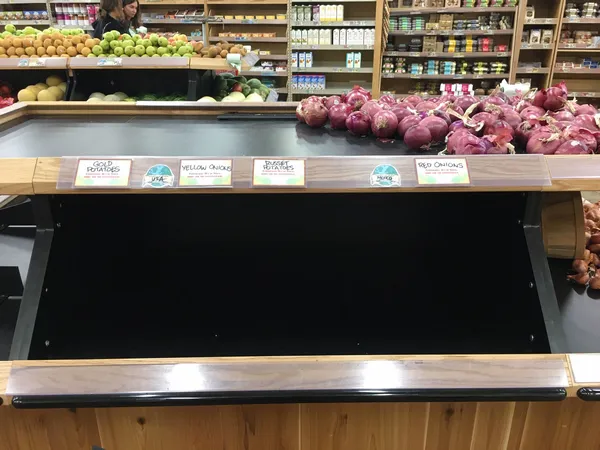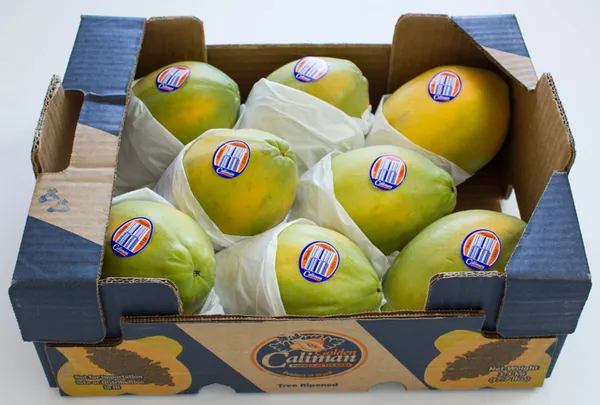“These are very strange times and the information we are receiving is very fluid,” says Chris Sarantis with Montreal-based Canadawide who imports produce from all over the world to be distributed in Canada’s larger metropolitan areas including Toronto and Montreal. “Changes are occurring constantly, and the current situation may be different by tonight, but one thing is certain: this situation has multiple challenges,” he added.
“In the first place, we are seeing panic shopping as a result of anxiety, but when it comes to fresh produce, there is plenty of product available. Staple items like potatoes and onions are moving fast, but availability is not a problem. Then, there is the reality of school shutdowns across North America,” Sarantis said. With restaurants in some areas being closed and people generally staying home more, most people now eat at home. As a result, retail stores need to replenish their stock a lot more.
 This Trader Joe's store was out of potatoes and the choice of onions was limited to red.
This Trader Joe's store was out of potatoes and the choice of onions was limited to red.
Transition and rain impact supplies
According to Sarantis, the biggest challenge in produce supplies currently is not the coronavirus. “We are seeing lower availability because many vegetable items are in a transition period. They are moving from the desert areas in Arizona and Southern California to California. On top of that, it has been raining for days in California and after a short break, more rainfall is expected this coming weekend. “These two occurrences, not the coronavirus, impact supplies and result in limited availability for some items.”
Food flows despite border closures
On Monday, Canada closed its borders to anyone not a citizen, an American or a permanent resident. “In this message, people tend to miss a part that leaders have addressed,” said Sarantis. “Yes, we are closing borders to international travelers, but food continues to flow.” This also includes fresh produce. “Containers with import product are still coming in without any hick-ups and there are also no changes to trucks from the US bringing in food. However, we are seeing challenges with air shipment as more and more countries are suspending air travel.” All EU flights into Canada have stopped, but the option of cargo flights is being reviewed. It is mainly specialty items that arrive through air and customers may temporarily see less of these in stores.
Flight reductions and high airfreight rates
Although specialty items are a relatively small part of Canadawide’s business, for some companies, air travel is a significant part of their business. HLB Specialties for instance sent out a mailing to its customers letting them know that they are dealing with drastic flight reductions. Their golden papaya and ginger are air-flown from Brazil and were one of the first items to be affected. “Our cargo agents are fighting to get as much space as possible, but unfortunately there will be cancellations and shortages,” said Melissa Hartmann de Barros with the company. “There are still flights leaving Brazil, but fewer and fewer passengers are filling up the seats. To compensate for the lack of passengers, airlines are charging higher freight rates and we are expecting airlines to soon cancel even more flights. From Brazil there are not a lot of freighter operations. It is possible that some cargo planes will start operating, but we haven’t received confirmation yet,” she added. It is expected that those airlines that are still active will substantially increase their freight rates, some by more than double.

Two crucial weeks for South America
In addition to Brazil, Ecuador and Colombia are also impacted. “On the positive side, there are more freighters out of these countries due to the flower industry. However, retailers are slowing down their flower orders as they give priority to essential items,” Hartmann de Barros explained. It remains to be seen how the supply into the US, Canada, and Europe continues. HLB Specialties hasn’t started its Guatemalan rambutan season yet. Since rambutans come in via cargo freighters, the company expects air-flown product from Guatemala to remain steady. “The next two weeks will be crucial for the air-flown items from South America in general.”
Will crucial border with Mexico stay open?
Continental Fresh, who imports squash, cucumbers, mangos and pineapples from Mexico and Honduras, also notices the massive increase in business. “Sales for retail have been through the roof and it’s like a frenzy for product,” says Albert Perez with Continental Fresh. “Buyers don’t care what size it is. If they ask for large and I only have jumbo, they’ll still take it.” Foodservice sales on the other hand are way down.
The big question is how long will this frenzy last and how long will the borders stay open? “For mangos, we are transitioning now from our Honduran and Central American sourcing regions into Mexico, so that Mexican-US border is very crucial to us at this point,” he said. “If the border was to be closed tomorrow, we would not be able to bring in any product. There is no contingency.”
“We have been trying to keep up with this increased demand and are bringing product in as fast as we can. We fear that at some point, something will stop it. Whether it is a border closure or decreased demand. We just don’t know if people will continue to buy fresh produce or if people get quarantines, we may only be able to go to the store every so often. That could significantly decrease demand. So right now, we’re just trying to keep up with demand. These are unchartered waters. We’ve never been here before.”
For more information:
Chris Sarantis
Canadawide
Tel: (514) 382-3232
chris@canadawidefruits.com
Melissa Hartmann de Barros
HLB Specialties
Tel: (954) 475-8808
melissa@hlbspec.com
Albert Perez
Continental Fresh
Tel: +1 (305) 860-9611
albert@continentalfresh.com
